Iowa Arrest Records – Search with Arrests.org IA
Searching for someone’s background in Iowa can be challenging due to various record-keeping agencies. At Records Page, we simplify this process with our free guides, helping you navigate public records in lowa.
Our Guides Provide Valuable Information:
- Checking recent Iowa arrests, reasons, mugshots, and bail options
- Exploring Iowa court records for a person’s criminal history
- Obtaining copies of Iowa criminal records and learning how to seal or expunge them
- Discovering active warrants in Iowa
- Identifying whether someone is incarcerated in a federal or state prison in Iowa
- Conducting an Iowa background check for various screening purposes
- Understanding Iowa state public record laws to ensure fair hiring and employment practices
Start your search for Iowa criminal and arrest records here.
Public Information in Iowa
Iowa is a sunshine state, which means most records generated by governmental agencies operating within the state are considered public records. Iowa criminal records, including arrest records, fall under this category.
However, there are exceptions to what can be disclosed:
- Communication between a crime victim and their counselor
- Investigative reports when the matter is still open and the investigation is active, unless disclosure will help safeguard the general public or the assistance of the public is needed to catch a dangerous suspect
- Mental health crisis response report by law enforcement
- Law enforcement records that disclose addresses of law enforcement officers, files that identify confidential informants or witnesses to crimes
- Juvenile criminal records
Despite these exceptions, all adult arrests, charges, and convictions are considered public records and can be accessed by anyone, unless sealed or expunged.
When using public records for hiring, licensing, or leasing decisions, it’s important to adhere to federal laws such as the Fair Credit Reporting Act (FCRA), which limits the use of credit history and criminal non-conviction history to a specific look-back period. Additionally, federal anti-discrimination laws enforced by the Equal Employment Opportunity Commission (EEOC) prohibit using criminal history to discriminate against protected classes.
Iowa Criminal Records vs Arrest Records: What’s the Difference?
While people sometimes use the terms interchangeably, criminal records and arrest records are not exactly the same. Here’s what each includes:
- Criminal Records: Provide a comprehensive history of a person’s criminal activities, including arrests, charges, and convictions
- Arrest Records: Focus specifically on the details of an individual’s arrests, including reasons, mugshots, and bail options
By understanding the differences between these records, you can make more informed decisions when conducting background checks. Start your search for Iowa criminal and arrest records today.

Understanding Arrest Records in Iowa
An arrest record in Iowa signifies that a person has been charged with a crime and apprehended by the police. These records provide details about when and why the arrest took place, as well as the location where the individual is being held until further legal proceedings.
It’s important to note that an arrest record is just one part of the overall criminal record and does not encompass the entire case. A comprehensive Iowa criminal record includes additional information about the case, with a particular focus on the disposition.
The disposition of a case refers to the outcome after it has been presented in court. This includes whether the case was dismissed, dropped, or if the individual was found guilty or not guilty. Additionally, criminal records may also indicate if the person participated in a diversion program or deferred prosecution.
Criminal records in Iowa also cover pending charges that did not result in an arrest warrant but instead required a summons to appear in court. Furthermore, these records provide information about sentencing, such as probation or prison sentences. However, it’s important to note that expunged matters will not be included in criminal records.
While official background checks primarily focus on convictions, individuals may have a genuine interest in knowing who has been arrested in their area and the reasons behind it. Understanding how to access arrest records in Iowa is crucial for obtaining this key information.
Discovering Recent Arrests and Finding Iowa Jail Information
If you want to find out who is in jail in Iowa, it’s essential to know where to look. When someone is taken into custody, the first questions often revolve around the reason for their arrest and the location of their detention.
Here are the steps to follow when trying to determine why someone was arrested:
- Gather essential information, such as the person’s name, approximate date and time of arrest, and the law enforcement agency responsible for the arrest.
- Use search engines to look for the official website of the relevant police department or sheriff’s office. Pay attention to the website’s URL to ensure it is the official agency page.
- On the agency’s website, locate the section labeled “Inmate Roster” or “Search for Inmates” through the provided hyperlinks.
- Enter the required information, such as the name of the arrested person, to conduct a search. Some departments may provide a list of current inmates instead of individual searches.
- If no inmate roster or search option is available, contact the non-emergency phone number provided on the website for further assistance.
For example, if you’re searching for an inmate in Polk County, you would search for “Iowa Polk County Sheriff’s Office Arrest Records” and navigate to the official jail and arrest information page of the Polk County Sheriff’s Office.
By following these steps, you can effectively search for arrest records and inmate information in Iowa, allowing you to stay informed about recent arrests and individuals in custody.
To begin your search for current arrest records, follow these steps:
Accessing Current Inmate Listings
- Click on the “Current Inmate Listing” hyperlink provided on our website.
County law enforcement officers are not the only ones responsible for arresting individuals charged with crimes. City police departments also play a vital role in apprehending alleged offenders and ensuring their proper housing pending trial. Here’s how you can look up recent arrests in Iowa’s city jails:
Looking Up Recent Arrests in Iowa’s City Jails
To find recent arrests made by municipal law enforcement agencies in Iowa:
- In Google, type “Iowa [City Police Department] Arrestee Search.”
- Review the top 1-4 search results for the official police department website and click on the corresponding link.
- Check the homepage for a link to search inmates or a hyperlink labeled “City Jail” or “Corrections.”
- If no such link is available, look for the non-emergency number of the police department and call for information on the arrestee’s location.
For example, if you search for Cedar Rapids Police Department, you will learn that there is no city jail. Inquiries regarding recent arrests can be made by calling the non-emergency number, 319-286-5491.
It is important to note that county jails should always be the primary source for locating someone who has been arrested. However, if you are unable to find the information at the county or city law enforcement level, you may consider seeking assistance from a bail bondsman.
Performing an Iowa Public Arrest Record Search
If you are interested in conducting a statewide records lookup for arrests in Iowa, follow these steps:
- In your preferred search engine, type “Iowa statewide arrest records search.”
- Review the top search results for the official government website that provides the information, which is the Iowa Courts website in this case. Please note that the official site ends in .ia.us, unlike most government sites that end in .gov.
- Select the hyperlink labeled “Click Here to Search.”
- Click the “Case Search” link under the Trial Courts heading.
- Fill in as much information as possible about the subject you are searching for. At a minimum, a last name is required.
- Under the “Role” dropdown menu, select “Defendant.”
- Keep the “County” field set to “All.”
- Under “Case Type,” choose “Criminal” from the dropdown menu.
- Complete the robot verification process.
- Click the “Search” button to view the results.
- Click on the case number to access the case file.
- Under the “Filings” heading, you can find information on any warrants issued leading to an arrest, including available bond details.
Remember, while the provided steps can help you locate arrestees, it is possible that an arrestee was released or bonded out before the search was conducted. Consulting an attorney can be a valuable resource for locating someone who was recently arrested and starting the defense process promptly.
Conducting comprehensive arrest record searches allows you to gather vital information about a candidate’s criminal history. This knowledge is crucial in making informed decisions for employment or personal matters, ensuring transparency and safety.
While county jail lists may provide photographs of alleged offenders, there is no central mugshot database in the state of Iowa. Therefore, utilizing the statewide arrest records search mentioned above can help uncover any arrests made in Iowa at any point in the past.
Bail in Iowa
- Introduction: Simplifying the process of arrest record checks, this search covers the entire state of Iowa, eliminating the need to contact individual sheriff’s offices or police departments. Discover the legal intricacies and motivations behind record checks with our meticulous step-by-step instructions.
- How to Contact a Jail Inmate & Post Bail: When a loved one is arrested, knowing how to make contact or post bail is crucial. Our comprehensive guide provides the necessary information to help secure their release before the hearing.
- Locating an Inmate: Our user-friendly steps not only help you locate an inmate but also provide insights into visitation, contact, and bail procedures at the jail. By accessing the website of the relevant sheriff’s office, you can easily access the policies and processes. Some websites even provide a list of approved bail bondsmen who can assist with posting bail.
- County Sheriff’s Office Information: Conveniently review information on how to contact inmates in county jails by visiting the respective county sheriff’s office websites. Simply click on the county jail link in our comprehensive tables, look for the inmate information or visitation hyperlink, and gain access to the necessary details.
- Example – Polk County, Iowa: For instance, Polk County, Iowa, with its largest population in the state, has detailed information on visitation and contact with inmates in the Polk County Jail. By clicking on the provided link, you can navigate to the Polk County Sheriff’s Office homepage, where you’ll find visitation policies, visitation days, times, and even information on web-based visits.
Clicking the link titled “Visiting an Inmate” will provide more detailed information.
- Posting Bail: Whether at the county jail or the clerk of court’s office, our guide assists in locating the appropriate place to post bail. Simply refer to our tables of county sheriff’s offices or the clerk of court’s locations, call the non-emergency number, and acquire the address and preferred methods of payment.
- Example – Woodbury County Sheriff’s Office: Woodbury County Sheriff’s Office provides comprehensive information on bonding procedures on their official website. The “Bonding Procedures” section outlines the process of posting bonds, including dates, times for cash bonds, and even how to find a licensed bail bondsman.
- Licensed Bail Bondsmen in Iowa: In Iowa, the use of licensed commercial bail bondsmen is permitted. However, it is crucial to ensure that the chosen bail bondsman is a certified professional operating within the state. Iowa has also established maximum bond amounts through Iowa Code 811.2, ensuring uniformity in bond-setting by judges based on offense classification.
- Searching Criminal Records in Iowa: Understanding how to conduct a comprehensive criminal history check in Iowa is vital, as arrests are just one part of the overall criminal record. Our guide provides the necessary information to run a complete criminal history, enabling informed decisions when hiring, leasing, or making other important choices.
How To Search Criminal Records in Iowa (Guide To Check Someone’s Criminal History)
Arrest records in Iowa are just a part of the overall criminal record, and knowing how to run a statewide criminal record search is vital when making decisions on hiring a new employee or leasing a home or apartment to someone. Since all charges end up in court either for dismissal or a hearing, a statewide search of criminal records can start with the state’s judicial branch.
- Local Records Search: In situations where a local background check suffices, learn how to search local records at the clerk of the court’s office, providing valuable insights for informed decision-making.
Perform Statewide Criminal Record Searches in Iowa Through Iowa Courts Online
For hiring managers, business owners, or other stakeholders requiring statewide or national criminal histories, knowing where to find statewide records is essential.
To conduct a statewide criminal record search for Iowa offenders, follow these steps:
- Open the Iowa Judicial Branch website.
- Click the online portal titled Iowa Courts Online Search.
- Select the link to search all case records available at the top of the page.
- Under Trial Courts, click the Case Search link.
- Enter the subject’s full name and any known aliases.
- Set the subject’s Role to Defendant.
- Choose Criminal under Case Type.
- Confirm that a robot is not completing the search by completing the required verification.
Add HTML tags around the headings, bolding, and paragraphs as needed.
Searching for Arrest Records
To search for arrest records in Iowa, follow these simple steps:
- Visit the Iowa Arrest Records Website: Begin your search by accessing the official Iowa Arrest Records website.
- Enter the Defendant’s Name: Input the name of the defendant you wish to search for in the provided search bar.
- Initiate the Search: Click the “Search” button to initiate the search process.
- Review the Results: A list of cases associated with the defendant’s name will appear. Click on each case for detailed information on its disposition, including whether the case was dismissed, if the person was acquitted or found guilty, and sentencing information.
Using our automated online directory provides a quick and convenient way to explore a person’s trial history in Iowa.
 Probationers and Parolees in Iowa: Accessing Free Online Searches
Probationers and Parolees in Iowa: Accessing Free Online Searches
Case Disposition: Discover an individual’s conviction status, imposed sentence, and whether they were placed under supervision through a diversion program or deferred prosecution.
Data Comparison: Compare the total number of probationers and parolees in Iowa with other states across the United States.
Ethnicity in Community Supervision: Gain insight into the ethnicities of individuals under community supervision in Iowa, encompassing both probation and parole.
 Searching Probation Records in Iowa
Searching Probation Records in Iowa
Visit the Iowa Department of Corrections Website: Access probation records and related information through the official Iowa Department of Corrections (IDOC) website.
Select Offender Search: Locate and click on the “Offender Search” option on the IDOC website’s homepage.
Enter the Subject’s Name and Initiate the Search: Enter the name of the subject whose probation records you wish to access and click the “Find” button.
Verify Search Results: Review the search results to ensure accuracy and that the displayed record corresponds to the subject of your search.
Access Record Details: Click on the subject’s name to access the detailed probation record.
Check Probation or Custody Status: Scroll to the bottom of the record to determine if the individual is currently on probation or in custody.
Additional Information in the Record: The record may include supplementary details such as the charges the individual was convicted of, date of commitment or sentencing, end date of the sentence, and the judicial district where the case was tried.
 Parole in Iowa: State Parolee Database
Parole in Iowa: State Parolee Database
To access information about individuals who have been released to community supervision before their sentencing date, follow these steps:
- Open the Iowa Board of Parole Offender Search Website
- Enter the Subject’s Name and Click the Find Button
- Review the Search Results
Ensure that the displayed information matches the subject of your search. By clicking on the subject’s name, you can access details such as gender, date of birth, supervision status, upcoming parole hearings (if applicable), offense classification, and end date of supervision.
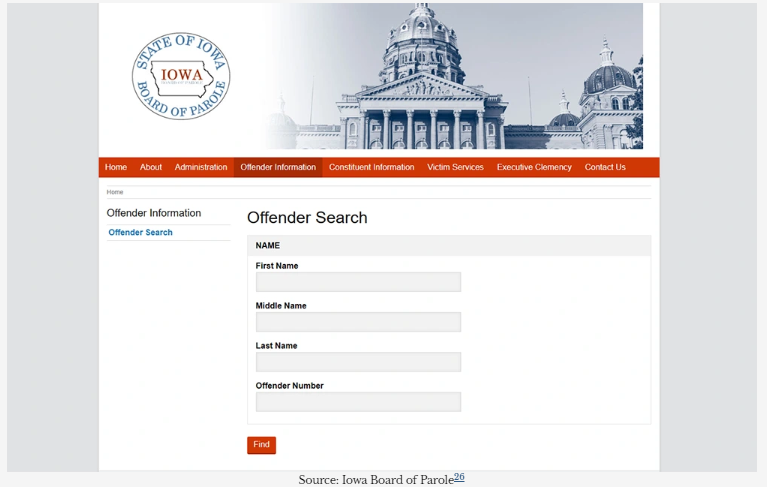 Probation and Parole in Iowa
Probation and Parole in Iowa
Probation and parole records are included in an individual’s overall criminal record in Iowa. Unless sealed or expunged, all criminal records are public. Learn more about sealing or expunging a criminal record in Iowa below.
Sealing or Expunging a Criminal Record in Iowa
Criminal charges and convictions can hinder employment opportunities, but it is possible to expunge certain Iowa criminal records. While an expungement does not completely erase a record, it seals it from public view, preventing inclusion in commercial or official background checks.
Guide to Expunging Records in Iowa:
Understanding Eligibility for Expungement in Iowa:
– Expungement is only available for certain cases in Iowa.
– Eligible cases include juvenile cases transferred to adult court then moved back to juvenile court, non-convictions such as dismissed charges or not guilty verdicts (with a required waiting period of six months), certain convictions after a two-year period with no additional charges filed, and other misdemeanors after eight years with no additional charges (except those prohibited by law) and completion of all sentencing requirements.
Step-by-Step Process for Expunging a Record in Iowa:
– Visit the clerk of the court’s office where the charges were adjudicated and fill out a petition to expunge the record.
– File the petition with the clerk of court.
– Submit a copy of the petition to the county attorney (district attorney).
– Alternatively, a petition can be filed online using the Iowa Judicial Branch e-filing link.
– There is no fee for filing a petition to expunge.
– A judge will review the petition and make a decision, but note that expunged records may still appear on local police records.
– While an attorney is not required, they can provide valuable assistance in ensuring correct completion of forms and addressing any issues that may arise.
Locating State Prisoners in Iowa:
– To find state prisoners in Iowa, use the Iowa Department of Corrections Offender Search Tool.
– Enter the person’s first name, last name, and date of birth to access online records showing their full name, DOC number, gender, date of birth, offense classification, and custody status.
– For federal prisoners, Iowa does not host any federal prisons, so use the Bureau of Prisons inmate locator.
Completing an IA Warrant Search:
– Arrest warrants are public records in Iowa, but not all law enforcement agencies publish a warrant list.
– Some sheriff’s offices, like Pottawattamie County Sheriff’s Office, have online warrant lists, while others, like Lee County Sheriff’s Department, do not.
– To conduct a warrant search, refer to the table of sheriff’s offices mentioned above. Wanted List
City law enforcement agencies may publish a list of the city’s most wanted online for the public and request anyone with information call in on a tip line or Crime stoppers number.
Background Check Requirements for Job Applicants in Iowa
When looking for work in Iowa, applicants want to know if they will be subjected to a background check, and what kind of agencies require extensive screenings. We’ve provided a table to help narrow down the search.
Finding Out Who Is a Registered Sex Offender in Iowa: How To Search the IA Sex Offender Registry
Sex Offender Search Process:
Access the Iowa Department of Public Safety Website
- Open the Iowa Department of Public Safety website to access the state sex offender registry.
Read the Disclaimer and Complete the Image Check
- After clicking the registry link, carefully read the disclaimer.
- Complete the image check as prompted on the screen.
Submit Your Search
- Click the “Submit” button on the screen to proceed with your search.
Choose Your Search Method
To find a registered sex offender:
- Enter the person’s first and last name for a name search.
- Alternatively, enter an address under the “Map Search” tab to view a geographic area.
Review Search Results
The search results will provide detailed information, including:
- A mugshot of the offender.
- The sex offender level the person is required to register under.
- Full name and any aliases.
- Physical description of the person.
- Any identifying scars or marks.
- Last known address.
- The offense for which the person was convicted.
These details can be compared to arrest records when conducting searches.
 Iowa State Laws on Criminal Records & Arrest Records
Iowa State Laws on Criminal Records & Arrest Records
When searching for any part of a person’s criminal history, whether it is a sex offender search, prisoner search, or arrest records, it’s important to have a basic understanding of the laws that govern the release and use of any Iowa criminal records.
Ban the Box Status in Iowa
Iowa is currently not a ban-the-box state, meaning that employers can inquire about a person’s criminal history at any point during the application or hiring process, except in Des Moines, which has passed a city ordinance prohibiting city agencies from inquiring about criminal history on applications.
Release of Records under Iowa Public Record Law
The release of records is outlined in the state’s public record law, Chapter 22 of the Iowa Code. This statute makes all arrest and criminal records public domain unless the matter has been expunged, or meets other criteria outlined in the statute, such as juvenile cases or information about witnesses or victims.
Child and Dependent Adult Abuse Check
Iowa Code 481-50.9(135C) requires a check for abuse of a child or dependent adult on all workers in childcare facilities, adult care facilities, individuals working with the elderly or disabled adults, or nurse aides. This is for individuals who provide both direct and indirect services and for volunteers and includes a felony registry search in addition to a sex offender registry search.
Federal Statutes Protecting Iowa Workers
Iowa workers are also protected under federal statutes, including the Fair Credit Reporting Act (FCRA), which limits background checks to a seven-year lookback period for credit history and non-convictions. FCRA rules cover commercial background check agencies that provide the service to employers for a fee, in addition to state agencies that conduct background screenings.
The Equal Employment Opportunity Commission enforces federal anti-discrimination laws to make sure agencies or organizations are not using criminal history as a means to unlawfully exclude a protected class of candidates from positions, and provides guidance to employers on how to use criminal history and arrests in making decisions.
Consent for Official Background Checks
Written consent is required to conduct an official, commercial use background check on anyone other than personal.Simplified Arrest Record Checks in Iowa
Running arrest record checks in Iowa does not have to be a difficult task, and this free guide can help anyone find out if someone they know has been arrested, is in jail, or has a criminal history with just a few clicks of the mouse. Getting Iowa criminal records can help make important decisions and avoid issues down the road.
FAQ’s
How can I perform an Iowa criminal and arrest record lookup?
To conduct an Iowa criminal and arrest record lookup, you should contact the Iowa Division of Criminal Investigation (DCI) or use their online resources. The DCI provides access to criminal history records through its website, where you can request a background check or search for specific records.
What information is required to perform a record lookup in Iowa?
To conduct a record lookup, you will typically need the full name and date of birth of the individual you are searching for. Some searches may also require additional identifiers such as a Social Security number to ensure accurate results.
Are Iowa criminal records available to the public?
Yes, Iowa criminal records are generally accessible to the public. However, certain sensitive information, such as juvenile records or sealed records, may have restricted access.
Is there a fee associated with accessing Iowa criminal and arrest records?
Yes, there is usually a fee associated with obtaining Iowa criminal and arrest records. The cost can vary depending on the type of search and the information requested. Be sure to check with the DCI or the specific agency you are using for the most up-to-date fee information.
How long does it take to receive the results of a record lookup in Iowa?
The processing time for Iowa criminal and arrest record lookups can vary. Online searches may provide immediate results, while requesting records through mail or in-person services may take longer, often several days to a few weeks. It’s essential to check with the specific agency for accurate processing time estimates.

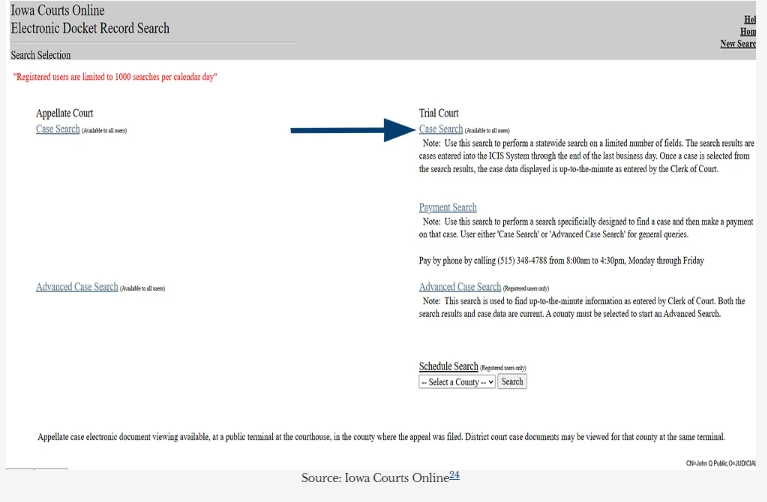 Probationers and Parolees in Iowa: Accessing Free Online Searches
Probationers and Parolees in Iowa: Accessing Free Online Searches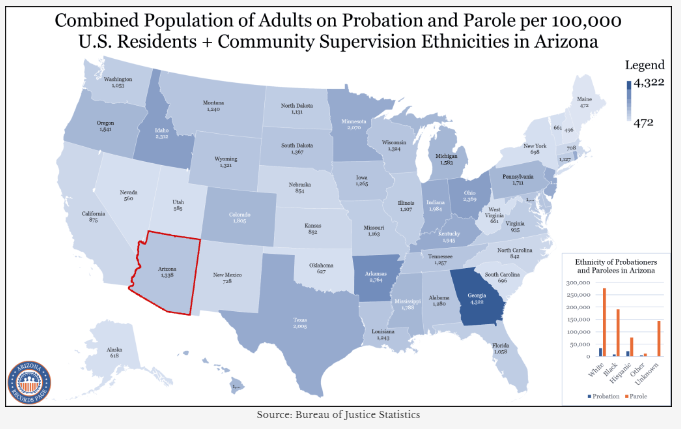 Searching Probation Records in Iowa
Searching Probation Records in Iowa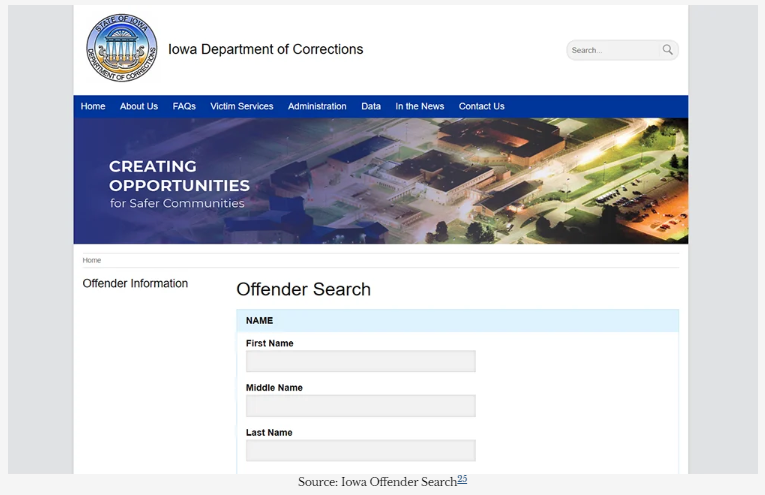 Parole in Iowa: State Parolee Database
Parole in Iowa: State Parolee Database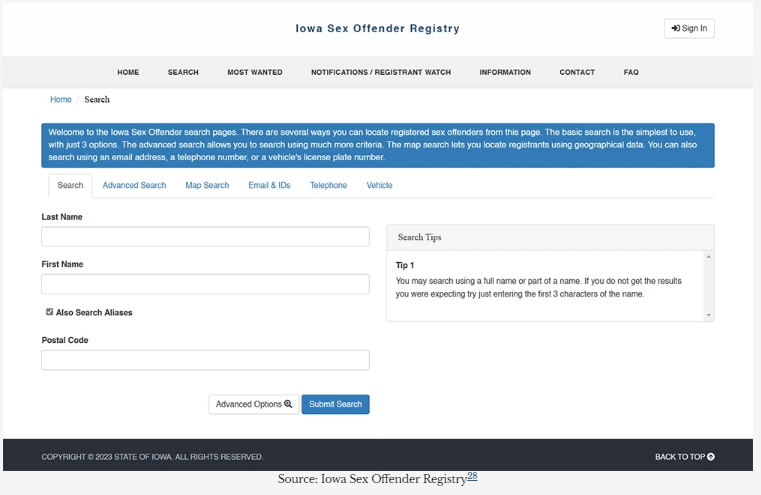 Iowa State Laws on Criminal Records & Arrest Records
Iowa State Laws on Criminal Records & Arrest Records